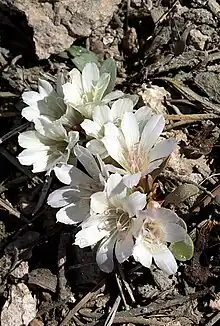Lewisia kelloggii
Lewisia kelloggii is a species of flowering plant in the family Montiaceae known by the common name Kellogg's lewisia. It is endemic to the Sierra Nevada of California, where it is known from several sites high in the mountains. It grows in rocky mountain habitat in granite and slate substrates. This is a perennial herb growing from a thick, short taproot and caudex unit. It produces a basal rosette of many thick, leathery, spoon-shaped leaves up to 9 centimeters long. The inflorescence bears several flowers, each on a very short stalk. The flower has 5 to 13 shiny white or pinkish petals just over a centimeter long. Under the petals are two sepals and two similar bracts lined with spherical resin glands.
| Lewisia kelloggii | |
|---|---|
 | |
| Scientific classification | |
| Kingdom: | Plantae |
| Clade: | Tracheophytes |
| Clade: | Angiosperms |
| Clade: | Eudicots |
| Order: | Caryophyllales |
| Family: | Montiaceae |
| Genus: | Lewisia |
| Species: | L. kelloggii |
| Binomial name | |
| Lewisia kelloggii | |
A population of Lewisia plants in the Sawtooth Range in Idaho were previously included in this species. Genetic analysis has shown that it is different enough to be considered a species of its own and has been named Lewisia sacajaweana, Sacajawea's bitterroot.[1][2]
References
- Who knew? Newly Delimited California Sensitive Plant Gains Protection from Rock Barrier and Informative Sign. US Forest Service.
- Ray-Vizgirda, E. Plant of the Week: Sacajawea's Bitterroot Archived 2012-10-14 at the Wayback Machine. US Forest Service.